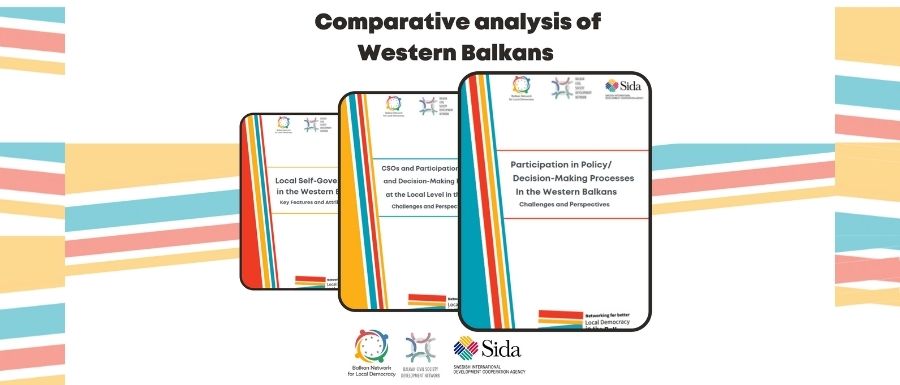Three comparative studies have been done, examining the level of citizen participation in decision-making process at local levels within the six Western Balkans countries (WB6); under the work of the project “CSOs Networking for Better Local Democracy in the Balkans”, funded by the Swedish International Development Cooperation Agency (SIDA) and implemented by the Balkan Civil Society Development Network (BCSDN), each of the above-mentioned studies focuses on a different facet of citizen participation. Yet, taken as a whole, they represent one comprehensive analysis.
The first book is about local self-government and decentralization in the Western Balkans. Decentralization is one of the most prominent series of reforms in the region. Across the different government systems in the region though, the level of decentralization differs due to various domestic factors. We see examinations of key features, structures, and mechanisms within the local government of multiple internal systems in the countries.
The publishing of these comparative analysis is meant to inform and act as a guide for interested citizens and groups
The second book is about CSOs and participation in decision and policymaking on the local level. Based on this, one can consider how the civil sector is important in strengthening democracy and accountability in the region, and to what extend CSOs play various roles with varying levels of political involvement. In addition, the study examines policies, initiatives, and mechanisms within the targeted region; acting as a guide for those who want to engage in local participation.
The third book is about local community participation in decision-making within the Western Balkans. Citizens’ participation is one of the hallmarks of democratic functioning, and each country has their own mechanisms and laws for regulating it. The purpose of the analysis is to further examine the interests, initiatives, and degree of participation in various municipalities.
Overall, local democracy and citizen participation continue to be a major fundamental focus in the empowerment of the Western Balkans region. The publishing of these comparative studies is meant to inform and act as a guide for interested citizens and groups.
You can download the comparative analysis available in 4 languages, English, Albanian, Macedonian and Bosnian/Croatian/Serbian here or visit our Resource Hub.
